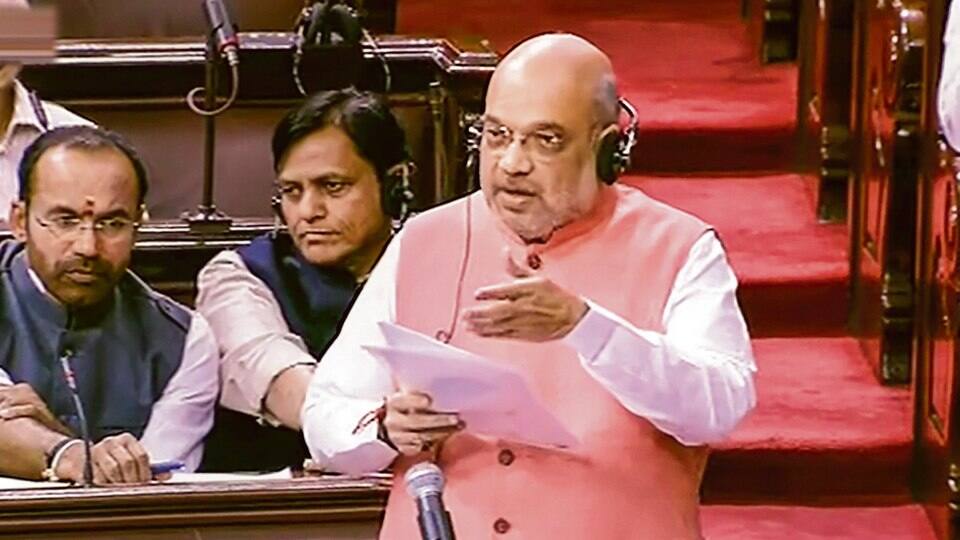
New Delhi: In a big push for India’s national security, the Rajya Sabha, on Wednesday, passed the controversial National Investigation Agency (Amendment) Bill 2019 unanimously, with a united show of strength from the Upper House.
The bill’s uncontested passage in the Upper House is a marked diversion from its discussion in the Lok Sabha on Monday, when the Centre and the Opposition sparred over the validity of the proposed amendments in the bill and its ability to rein in terror. Eventually, there were six voices of dissent in the Lok Sabha, as opposed to none in the Rajya Sabha.
While the Opposition parties raised doubts over the possible misuse of the Bill, speaking in the Upper House, Union home minister Amit Shah said, “I assure the House that the Bill will not be misused under any circumstances. If the country does not vouch for the efficiency of the NIA, how will it hold any standing globally? Both Houses need to prove to the world and the terrorists that we are united in this fight.”
Shah added that the proposed amendments would further empower the country to fight terror – as was evident in the fact that out of the 195 cases with the agency since 2014, 129 had been chargesheeted, with 41 convictions.
Minister of state for home affairs, G. Kishen Reddy told the house that from the NIA's inception in 2009 to 2014, the agency had registered 80 cases, out of which judgment was passed in 38 cases and 36 of which saw convictions. Reddy however, added that since Prime Minister Narendra Modi had assumed office in 2014, the agency had registered 195 cases – a huge jump from the United Progressive Alliance (UPA) government’s numbers.
The Congress party, while reaffirming its stand for strengthening national security, pointed out lacunae in the proposed amendments, reiterating that of the major cases -- such as the Samjhauta Express blast, Ajmer Dargah bombing, the Malegaon blast and the Sohrabuddin encounter case – none had reached a conclusive end.
“Section 4 of the amendment adds that the agency wants to go abroad and conduct investigations as they do in India. First of all, they don’t have the treatise to catch any person abroad without going through the local police force. Have you heard of that happening in India? So in practical effect they will have zero power, but they will show India that they have done something great,” said senior Congress party leader and Member of Parliament (MP) Abhishek Manu Singhvi.
The bill now awaits President Ramnath Kovind’s nod before it is deemed an act.
The NIA was set up in 2009 following the 26/11 Mumbai terror attacks which killed 166 people, with the Pakistan-based Lashkar-e-Taiba (LeT) claiming responsibility.
On Monday, the Lok Sabha passed the Bill with the opposition red flagging concerns of the bill being misused against certain communities.
The bill was passed after 278 members of Parliament (MPs) supported it, and six opposing it during voting.
The Bill proposes three major amendments to the NIA bill of 2008. The first amendment focuses on providing the NIA with more teeth to investigate cases pertaining to human trafficking, counterfeit currency or bank notes, manufacture or sale of prohibited arms, cyber-terrorism, and offences under the Explosive Substances Act, 1908.
At the same time, the Bill also seeks to expand the agency’s jurisdiction to investigate scheduled offences committed outside India, such as the Easter day bombings in Sri Lanka.
Finally, the bill also proposes to allow the Central government to constitute special courts for NIA trials for the trial of scheduled offences.
As of now, the NIA is designated to probe cases of terrorism within the country. Once the amendments are cleared by both Houses of Parliament, it will allow the NIA to probe cases of cybercrime and human trafficking as well, as per the proposed amendments.
The amendment is significant as the agency has been closely tracking the development of Islamic State (IS) modules in the country, especially in the wake of the Easter Day bombings in Sri Lanka.